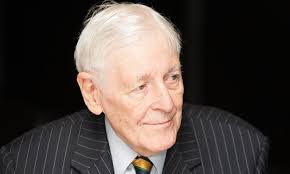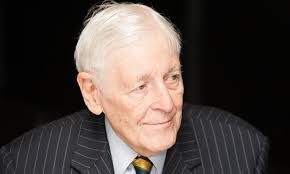As the United Kingdom grapples with the full implication of her recent decision to leave the European Union, it is most appropriate to celebrate the life of one of Britain’s most distinguished international human rights campaigners, the longest serving Liberal Democrat peer in the British House of Lords – Eric Lubbock, Fourth Baron Avebury, whose thanksgiving memorial takes place today at the Royal Institution in London.
I first met Lord Avebury in 1992 in the company of my colleagues, the late Tajudeen Abdul-Raheem and Olu Oguibe – of the New Nigeria Forum and our Ghanaian comrades in exile – at a time that the storm was feverishly gathering pace against the Babangida led military junta in Nigeria. That initial meeting in 1992 found us the most reliable supporter of our work in the hallowed halls of the British parliament. Lord Avebury was quite a phenomenon in British politics since he entered with a bang in 1962 when he pulled the most remarkable swing of 22 percent in British elections, taking over the Orpington seat in Kent from the Conservatives in that historic bye-election. His election signaled the revival of the Liberals in the British Parliament and became the bye-word for remarkable swings in bye-elections. He soon distinguished himself in parliament and barely one year into his membership of the House of Commons, he became the Chief Whip of the Liberals. In 1964, he became a member of the Speaker’s Commission on Electoral Law. He also served on the Royal Commission on Standards of Conduct in Public Life (1974 – 76). He left the House of Commons in 1970 after eight meritorious years and gained hereditary peerage as the Fourth Baron Avebury in 1971, a position he held until death came calling this year. In the Lords, he was the Liberals’ Spokesman on Immigration and Race Relations (1971 – 83) and later one of Liberal Democrat’s spokespersons on Foreign Affairs, speaking on conflict and human rights.
Although a brilliant constituency MP and a passionate liberal peer, what set him apart from other parliamentarians was his unrelenting commitment to human rights, first as Chairman of the Parliamentary Civil Liberties Group which subsequently transformed to the All Party Parliamentary Human Rights Group, which Lord Avebury chaired for 21 years (1976 – 1997), during which he chalked up a legendary reputation for self-sacrifice in the pursuit and protection of human rights across the world. Lord Avebury’s efforts in this regard opened up possibilities for many in distress through the opportunities for redress provided by him and a growing international coalition against tyranny. Lord Avebury raised the human rights thrust of his parliamentary advocacy above and beyond mere moralism, visiting no fewer than 35 countries (including Nigeria) for human rights and conflict resolution purposes. From Aceh in Indonesia to Kurdistan in Turkey, Ogoniland in Nigeria to the ethnic minorities seeking British nationality in Hong Kong, Lord Avebury’s Flodden Road’s home in Camberwell became a compulsory port of call for many human rights defenders, liberation fighters and political leaders from around the world.
In the period that I developed a close friendship with Lord Avebury, he met many of our own leaders – rights activists including Nobel laureate, Wole Soyinka, late Alao Aka Bashorun, Beko Ransome Kuti, Ken Saro Wiwa, Femi Falana, Ayo Obe, Olisa Agbakoba, Chidi Odinkalu and several others and politicians including the late Chief MKO Abiola, NADECO leaders in exile such as the late Chief Antony Enahoro, late Senator Abraham Adesanya, Air Cdre Dan Suleiman (rtd), General Alani Akinrinade, Professor Bolaji Akinyemi, Asiwaju Bola Ahmed Tinubu, Chief John Oyegun, Chief Raph Uwechue, Dr Akingba, Honourable Wale Oshun to name a few. Others like the late Chief Emeka Ojukwu also came calling and he offered his listening ear to all.Even Nigerian government, represented in the UK then by Alhaji Abubakar Alhaji and later Ambassador Uche Okeke equally had access to him.
Born on 29th September 1928, Eric Lubbock was educated at Upper Canada College in Toronto, Canada, Harrow School in London before studying Engineering at Balliol College, Oxford University. He served as a Lieutenant in the Welsh Guards upon leaving Oxford and subsequently worked at Rolls Royce as Production Engineer and Manager between 1951 and 1960. Clearly a product of privilege, his father was the First Baron Avebury and his mother was the daughter of the Fifth Baron Sheffield, he downplayed this illustrious background to advocate the cause of the oppressed and marginalized around the world. His remarkable public profile as a moral force shone more glaringly once governments anywhere in the world repressed the desire of their citizens to live in a society governed by constitutional rule of law and devoid of fear or coercion. With a life premised on the tenet of justice as the first condition of humanity, it is no exaggeration to describe him as one of the most dogged fighters for rights in the globe. Working as his Africa adviser in the Parliamentary Human Rights Group, one could not but notice his quiet but steely resolve, his admirable work ethic, punctuality, frugal life and conduct, personal discipline and diligence with records, all of which make him a model worthy of emulation.
His human rights activism was clearly values driven yet devoid of ideological grand standing. His methods were self-effacing, information technology savvy, clinically detailed and informed by comprehensive research perhaps due to his engineering background and extremely efficient. He spoke truth to power, no matter the cost but I found his ability to relate across spectra without compromising his principles truly remarkable. He was very much at home with the rich and the poor, the young and the old, the intellectual and the common man. A humanist to the core, he abhorred religiousity but was committed to secular Buddhism. To those who were familiar with Lord Avebury, we all know he must be turning in his grave as current events unfold in the United Kingdom. As a renowned promoter of multi-culturalism and positive race relations, he would have been unequivocal in his criticism of the dastardly race baiting that has accompanied the Leave campaign of the Brexit movement. Little wonder then that he was the first recipient of the Ahmaddiya International Moslems Peace Prize in 2009 even though he was not a Moslem.
Although Eric Avebury lived till the ripe old age of 87, one cannot but feel a deep sense of personal loss at his demise. As a beneficiary of his work and as his mentee, I cannot thank him enough on behalf of myself and my family, the democracy movement in Nigeria in particular and the global human rights movement. It was a delight that Lord Avebury took time out to visit Nigeria after democracy returned. In the year 2005, he delivered an inspiring lecture at the Nigerian Institute of International Affairs in Lagos on the occasion of my fortieth birthday and also took the opportunity to reconnect with his old friends in the Nigerian human rights and democracy movement, particularly the late Dr Beko Ransome Kuti and the then Governor of Lagos State, Asiwaju Bola Ahmed Tinubu. Even when his health started to fail, he still managed to keep in touch by email monitoring my own political journey, asking about the state of the Nigerian nation and the human rights situation in Nigeria.
Lord Avebury is gone but he cannot be forgotten – which is what inspires our present gathering today. He lived in a manner that was unique and transparently self-less. It is our duty to continue to celebrate his life and times while advancing the cause of justice and global human rights. Our hearts go to Lindsay – his widow and the entire Lubbock family.
Good bye my Lord. We shall miss you greatly.
Tribute given at the Memorial Thanksgiving of Lord Eric Avebury at the Royal Institution in London, United Kingdom on Thursday, June 30, 2016. Dr Fayemi is Nigeria’s Minister of Solid Minerals Development.


